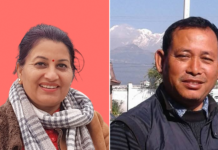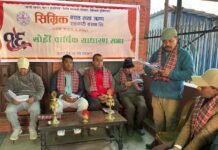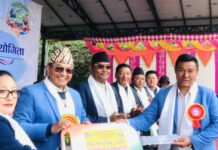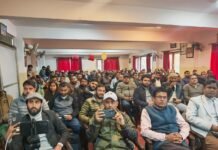Sanjeeb Prasad Dulal
Bhaktapur – “I am a farmer’s son, born into a traditional family in Bhaktapur. I run a small business here. I am HIV-positive, but I haven’t been able to disclose this to anyone in society,” says Suman Shrestha (name changed).
Suman, who operates a traditional mill in Bhaktapur, earns a decent living. Despite this, he has kept his HIV status a secret, even from his community.
A similar story belongs to Ramakanta Shrestha (name changed), a professional driver. Not only is Ramakanta HIV-positive, but his entire family is also infected. However, like Suman, he cannot reveal his condition to society.
Both were drawn into substance abuse by social norms in their community. What started as experimentation soon became addiction, leading to severe consequences. Their use of intravenous drugs eventually resulted in HIV infection.
 A Traditional Lifestyle Leads to Risks
A Traditional Lifestyle Leads to Risks
Growing up in a Newar family in Bhaktapur, both Suman and Ramakanta were exposed to alcohol as part of cultural rituals, festivals, and social gatherings. Drinking was normalized.
Suman recalls one Shivaratri when his friends encouraged him to try marijuana. What began as casual fun on that day and subsequent festivals like Holi soon developed into habitual use. Eventually, he moved on to stronger substances, culminating in injecting drugs.
“By the time I realized my mistake, it was too late,” Suman confessed. His HIV diagnosis drove him to attempt suicide several times, but his family’s support kept him alive.
Despite continuing his traditional work and earning enough to support himself, Suman lives in constant fear. “If anyone finds out, I might have to leave my ancestral home,” he says.
 The Social Stigma of HIV in Bhaktapur
The Social Stigma of HIV in Bhaktapur
Bhaktapur, while connected to the capital and rich in tourism, religion, and history, remains socially conservative. Suman fears that if his condition is revealed, he will face discrimination.
Ramakanta shares the same plight. Along with others like them in Bhaktapur, they live burdened not only by their illness but also by the societal stigma surrounding HIV.
Govinda Karki, a community mobilizer at “Suruwaat Community-Based Care Program,” which works on HIV awareness in Bhaktapur, highlights the deep-rooted stigma and discriminatory attitudes. According to Karki, HIV-infected individuals often avoid seeking local treatment out of fear of being ostracized, opting instead for expensive hospitals in Kathmandu.
Karki notes that Bhaktapur’s society, while historically rich, is equally old-fashioned in its attitudes. The lack of awareness and empathy further marginalizes those living with HIV.
 A Hidden Epidemic
A Hidden Epidemic
As per Suruwaat’s data, Bhaktapur has 72 individuals regularly taking antiretroviral therapy (ART), with 60% being non-locals. Many locals avoid seeking treatment within Bhaktapur, fearing exposure.
According to Karki, some families in Bhaktapur have up to three members infected. “If their status becomes known, even their children may face exclusion from schools,” he explains.
Currently, Bhaktapur has 13 children living with HIV. Single women make up a significant proportion of those affected. The situation is exacerbated by the high prevalence of intravenous drug use, with over 1,200 users in the district. Daily, more than 500 syringes are reportedly used by drug users in Bhaktapur.
 Systemic Challenges
Systemic Challenges
Rajesh Didiya, former president of the National Federation of HIV and AIDS, points out that despite over 500 organizations working on HIV/AIDS across the country, including at provincial and local levels, the infected still live in fear.
Bhaktapur lacks critical facilities like CD4 testing equipment, forcing patients to travel to Kathmandu for ART. Local governments’ apathy further isolates these individuals.
A 2003 survey by New ERA showed that 61% of drug users in Bhaktapur used injectable substances. Follow-up studies by Suruwaat confirm the number remains above 60%. Yet, local municipalities remain unaware of the true extent of the epidemic.
 The Way Forward
The Way Forward
The growing problem demands action not just from the federal government but also from local authorities. Only by implementing life-saving programs and fostering societal acceptance can Bhaktapur reduce HIV stigma and improve the lives of those affected. Addressing the stigma and strengthening local healthcare systems are vital steps toward reducing HIV infections and supporting those who are already suffering.










































 A Traditional Lifestyle Leads to Risks
A Traditional Lifestyle Leads to Risks The Social Stigma of HIV in Bhaktapur
The Social Stigma of HIV in Bhaktapur A Hidden Epidemic
A Hidden Epidemic Systemic Challenges
Systemic Challenges The Way Forward
The Way Forward